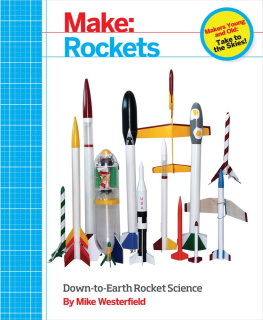Kellie Gerardi - Not Necessarily Rocket Science
Here you can read online Kellie Gerardi - Not Necessarily Rocket Science full text of the book (entire story) in english for free. Download pdf and epub, get meaning, cover and reviews about this ebook. year: 2020, publisher: Mango Media, genre: Non-fiction. Description of the work, (preface) as well as reviews are available. Best literature library LitArk.com created for fans of good reading and offers a wide selection of genres:
Romance novel
Science fiction
Adventure
Detective
Science
History
Home and family
Prose
Art
Politics
Computer
Non-fiction
Religion
Business
Children
Humor
Choose a favorite category and find really read worthwhile books. Enjoy immersion in the world of imagination, feel the emotions of the characters or learn something new for yourself, make an fascinating discovery.
- Book:Not Necessarily Rocket Science
- Author:
- Publisher:Mango Media
- Genre:
- Year:2020
- Rating:5 / 5
- Favourites:Add to favourites
- Your mark:
- 100
- 1
- 2
- 3
- 4
- 5
Not Necessarily Rocket Science: summary, description and annotation
We offer to read an annotation, description, summary or preface (depends on what the author of the book "Not Necessarily Rocket Science" wrote himself). If you haven't found the necessary information about the book — write in the comments, we will try to find it.
Not Necessarily Rocket Science — read online for free the complete book (whole text) full work
Below is the text of the book, divided by pages. System saving the place of the last page read, allows you to conveniently read the book "Not Necessarily Rocket Science" online for free, without having to search again every time where you left off. Put a bookmark, and you can go to the page where you finished reading at any time.
Font size:
Interval:
Bookmark:

Copyright 2020 Kellie Gerardi
Published by Mango Publishing Group, a division of Mango Media Inc.
Cover Image: Jesse Dittmar, Kellie wearing a Final Frontier Design spacesuit
Cover Design, Layout & Design: Morgane Leoni
Mango is an active supporter of authors rights to free speech and artistic expression in their books. The purpose of copyright is to encourage authors to produce exceptional works that enrich our culture and our open society.
Uploading or distributing photos, scans or any content from this book without prior permission is theft of the authors intellectual property. Please honor the authors work as you would your own. Thank you in advance for respecting our authors rights.
For permission requests, please contact the publisher at:
Mango Publishing Group
2850 S Douglas Road, 2nd Floor
Coral Gables, FL 33134 USA
For special orders, quantity sales, course adoptions and corporate sales, please email the publisher at or +1.800.509.4887.
Not Necessarily Rocket Science: A Beginners Guide to Life in the Space Age
Library of Congress Cataloging-in-Publication number: 2020940933
ISBN: (print) 978-1-64250-410-1, (ebook) 978-1-64250-411-8
BISAC category code SCI098000, SCIENCE / Space Science
Printed in the United States of America
For Delta V.
There are no passengers
on Spaceship Earth.
We are all crew.
Marshall McLuhan
Contents
When I was young, I often wondered how people in the Renaissance regarded their own era. Did the general public clock the rise of polymaths like da Vinci or Michelangelo as historic humans? Could they feel the tug of modernity as the medieval world melted into the past? Its doubtful that anyone extrapolated a global cultural awakening from the freshly painted ceiling of the Sistine Chapel. Its even more unlikely that anyone in the Stone Age paused pummeling their dinner with a club to think about the profound impact of that percussion on the trajectory of the entire human species. Denizens of the Enlightenment were not explicitly told that they were entering an Age of Reason and folks in the Industrial Revolution buzzed about their days unaware that their highly productive lives coincided with one of the major innovational turning points in all of huma n history.
Of course, each of these eras was named after the fact, labels of approximation rather than precision, a set of belated bookends for more modern humans to organize history and figure out how we surpassed our humble roots to become the mightiest species on Earth. But might the velocity have been different if everyone, not only the history book celebrities, had considered their own individual role in that journey and the opportunity in front of them? What might societies have done differently if individuals were privy to the trajectory of the entire species, or better yet, equipped from birth with a handbook about their generations unique stop on the human journey? Welcome to the world, tiny human, and listen up!
What a time to be alive then, to recognize our own era within history. If no one has shared the good news yet, please let me be the first to welcome you to a full-blown Space Age! The human species is on an astronomical trajectory and it would be an honor to take you on a brief tour of our very own moment in history as its happening. This is our chance to find out how much momentum might be gained if everyone not only the rocket scientistsoperates with the same level of awareness around this incredible window of opportunity. Consider this a beginners guide to life in the Space Age.
Art was only one manifestation of a new way of thinking in the Renaissance. Cultural innovation was equally apparent across the vastly different disciplines of medicine, technology, religion, politics, philosophy, science, and even warfare. Similarly, engineering feats represent one small slice of the Space Age. Future historians will widen the lens on a broader cultural movement that saw twenty-first-century humans contemplating our next giant leap as a species, marking the beginning of our transition from the Earth to the stars.
It should be obvious then that the future of our species doesnt rest solely on the shoulders of rocket scientists; like any turning point in history, humanitys next giant leap will require the contributions of artists, engineers, and everyone in between. For the first time in more than 4.5 billion years, life on Earth has the ability to venture beyond this planetthe potential to become interplanetary and secure a long-term survival in the cosmos. Thanks to the rise of the commercial spaceflight industry, routine space travel has become a dream within anyones reach. My own career is a testament to that democratized access: as a non-engineer I went from dreaming about the promise of space exploration to contributing to it, and eventually to training for it myself.
Im sharing my own experiences and reflections in the hopes that they might spark your own passion for exploration and discovery. At the very least, I hope you find yourself in the conversation and recognize your rightful place in the Space Age. Human spaceflight is about more than simply satisfying curiosity and inspiring dreams; its also about ensuring the survival of a species whose home planet has an expiration date. At the more generous estimates, were looking at a few billion years, when our sun ceases to provide its nurturing energy for life on Earth. Or perhaps its a few million years, when another rock along the size of a dinosaur-level extinction makes impact. Or maybe its a whole lot sooner, a Russian roulette of global pandemic, massive ecological collapse, or nuclear obliteration with just the push of a button.
But the human species is nothing if not resilient. For 200,000 years weve moved forward together, a species both mission-driven and coordinated. From the moment we stood upright, weve been forced into a fighting stance against nature, disease, predators, and perhaps most viciously, ourselves. For millennia weve harnessed our collective force to defy the odds and propel ourselves into the future. Our scrappiness and grit saved us from mass extinctions and an Ice Age that nearly extinguished our journey before it began. Our cleverness earned us millennia of cultural and scientific advancement, and most recently, a very promising start to this Space Age. Together weve made glory worth pursuing, new frontiers worth exploring, and survival worth fighting for. Weve put up one hell o f a fight.
And now, through luck of birth, you and I find ourselves at the starting line of the final frontier. Were holding the baton of survival that has passed through the hands of 10,000 generations of humans before us. Too many times throughout history has that baton almost dropped and the spark of life been extinguished. But at each baton fumble, another hand swooped in to secure it. Sometimes that hand belonged to an engineer, inventing tools to advance us or medical breakthroughs to heal us; other times the hand belonged to an artist, creating the language to connect us or the culture to civilize us. Encore! The survival of our species has always depended on a diversity of talent and contributions, and damned if were going to let the baton drop on our watch.
Each one of us has a role to play in humanitys next chapter. You dont need to be an astronaut to feel goosebumps during the countdown of a rocket launch or a surge of adrenaline watching humans take flight; all of us are wired to appreciate the profundity in the sights and the sounds of the final frontier. Our subconscious recognizes that to launch something off of this planet is a uniquely human act of resilience, a primal survival instinct that has carried the species all the way to the twenty-firs t century.
Next pageFont size:
Interval:
Bookmark:
Similar books «Not Necessarily Rocket Science»
Look at similar books to Not Necessarily Rocket Science. We have selected literature similar in name and meaning in the hope of providing readers with more options to find new, interesting, not yet read works.
Discussion, reviews of the book Not Necessarily Rocket Science and just readers' own opinions. Leave your comments, write what you think about the work, its meaning or the main characters. Specify what exactly you liked and what you didn't like, and why you think so.

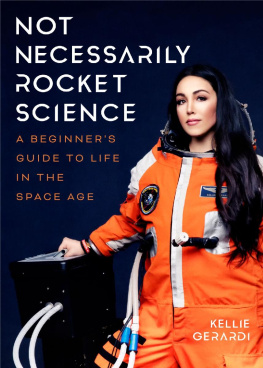
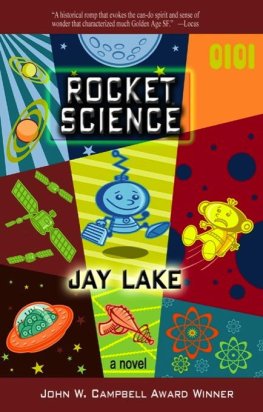




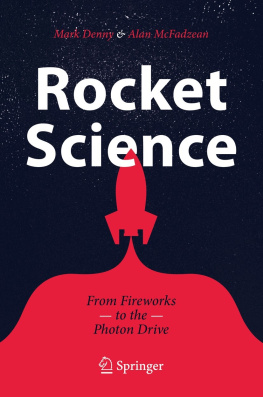
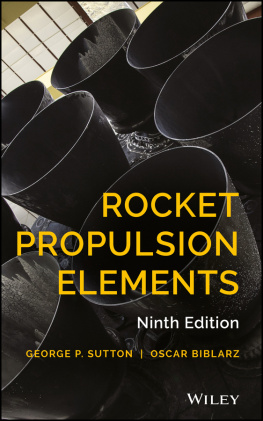
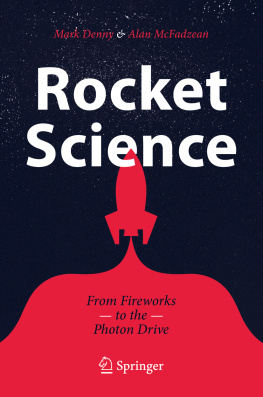
![Thomas Jenner - Kellie’s Diary Complete [All In One]](/uploads/posts/book/124160/thumbs/thomas-jenner-kellie-s-diary-complete-all-in.jpg)
